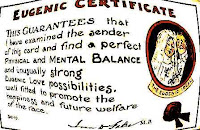 |
| r-selected SURVIVORS |
This article - once filtered through the language of my blog (ie once converted in SVEse) - says that the poor instinctively use cautious "grounded" science to survive, while the rich delude themselves by thinking "blue sky" science really makes sense.
The rich do not take responsibility for their basic daily lives - instead they pay other people to look after them - but the poor do make many decisions and do take responsibility for their daily lives.
In fact, the poor must make so many tough decisions every hour of every day that they wind up so "cognitively exhausted" that they can't begin to think of future plans --- an area where the cocooned rich excel.
"My child is sick and we both work at low paying jobs - one of us stay home and lose pay to look after child - but then how to get the extra money to buy the antibiotics the child really needs to get better, when we will actually have less take-home pay this week ?"
"Money on fertilizer to improve my soil for a better crop in the Fall or spend it on food now so I can have the strength to plow what quality of soil I have now ?"
Being poor makes you resourceful and flexible, just to survive - makes you r-selected in practise.
It also makes you r-selected in philosophy : you see Reality as constantly presenting you with unexpected surprises, most of them unpleasant, so it is best to travel light and stay flexible as to what you'll must do to survive.
By contrast, the upper middle class white protestant male of the 1840s and the 1940s (and probably the 2040s as well) was totally cocooned in a support system.
The efforts of his wife and servants meet his basic physical needs .
His parents' wealth and connections along with his expensive professional education all came together with his ethnicity, religion and gender to ensure his formal and informal privileged status when it came to his chances of entering the"gated occupational communities" like Med School or the Military Academy that were the stepping stones to success.
His take on Reality is likely to be K-selected : I am totally fit to totally fill Nature's biggest single niche : Planet Earth. The world is Man's oyster, it is my oyster : Reality is, underneath its false surface complexity, basically simple, repetitive, stable and above all, ultimately controllable by Man.
Romney told the now infamous Florida audience exactly the same Big Self-Lie that Charles Darwin told himself in his unpublished autobiography : I inherited nothing ( says son of automobile industry CEO and governor of the world's leading automotive industry state) - anything I have, I earned it the old fashioned way.
By contrast, Darwin's most exhaustive biographer, Janet Browne, details how Darwin's doting father lavished microscopes on his child, just as toys, each which cost far more than the annual income of a working class family.
Family wealth made Darwin the excellent amateur scientist he became.
It gave him lots of time and energy for his hobby because he already had a secure daily living without work. Wealth gave him plenty of space and equipment for his experiments as well as giving him an excellent scientific education with the scientifically powerful.
Above all, it gave him the means to control his scientific image - worldwide - from his rural sick bed ,via the new postal service system.
Again Darwin could afford to spend, just on stamps, more than what a family full of industrial workers earned all year ,working themselves to exhaustion from dawn to dusk.
The ungrateful Charles Darwin - a really nasty piece of goods - dissed his doting father in his autobiography and claimed his success all came from his own efforts.
I don't like Darwin and I don't think I like Romney - I simply don't like those who are so selfish and so self-centered that they have no insight into how they got to where they are.
Yes, both men are clever and are hard working - but their rise to the very top was also engineered by their standing on the shoulders of giants --- their parents......





